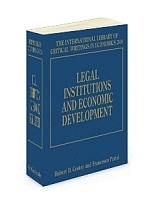‘The study of the interaction between legal institutions and economic development is
one of the most important research areas in economics and law. Professors Cooter and
Parisi have produced a remarkable anthology. Their selection of articles and the way they
have structured the literature form an original contribution in themselves. Even those who
are already familiar with the literature will enjoy the refreshing perspective that is
being offered by two of the leading scholars in the field.’
– Gerrit De Geest, Washington University, St. Louis, US
This insightful collection of classic papers explores the effects of various
legal institutions and policies on economic development. The editors include analysis of
the historical, current, and future conditions of numerous legal traditions and
strategies, both nationally and globally. The volume will enhance understanding of how
legal policies influence economic growth. It will also contribute to the selection and
advancement of those legal policies most likely to improve overall economic development
and social welfare.
This volume is an invaluable reference source for both scholars and
practitioners interested or involved in the development of legal policy.
Edited by Robert Cooter, Herman F. Selvin Professor of Law, University
of California, Berkeley, US and Francesco Parisi, Oppenheimer Wolff and
Donnelly Professor of Law, University of Minnesota, US and Professor of Economics,
University of Bologna, Italy
Contents:
Acknowledgements
Introduction Robert D. Cooter and Francesco Parisi
PART I LAW, FINANCE AND ECONOMIC DEVELOPMENT
1. Rafael La Porta, Florencio Lopez-de-Silanes, Andrei Shleifer and Robert W. Vishny
(1998), ‘Law and Finance’
2. Paul G. Mahoney (2001), ‘The Common Law and Economic Growth: Hayek Might be
Right’
3. Frank B. Cross (2002), ‘Law and Economic Growth’
4. Edward L. Glaeser and Andrei Shleifer (2002), ‘Legal Origins’
5. Bernard S. Black and Vikramaditya S. Kahanna (2007), ‘Can Corporate
Governance Reforms Increase Firm Market Values? Event Study Evidence from India’
PART II COMMON LAW AND LEGAL EVOLUTION
6. Mark J. Roe (1996), ‘Chaos and Evolution in Law and Economics’
7. Y. Barzel (2000), ‘Dispute and its Resolution: Delineating the Economic Role
of the Common Law
8. Vincy Fon and Francesco Parisi (2003), ‘Litigation and the Evolution of Legal
Remedies: A Dynamic Model’
9. Keith N. Hylton (2006), ‘Information, Litigation, and Common Law Evolution’
PART III PUBLIC CHOICE AND PUBLIC LAW
10. Frank H. Easterbrook (1983), ‘Statutes’ Domains’
11. McNollgast (1994), ‘Legislative Intent: The Use of Positive Political Theory
in Statutory Interpretation’
12. Robert Cooter (2002), ‘Constitutional Consequentialism: Bargain Democracy
versus Median Democracy’
13. Francesco Parisi (2003), ‘Political Coase Theorem’
14. Alan Schwartz and Robert E. Scott (1995), ‘The Political Economy of Private
Legislatures’
15. Tom Ginsberg (2002), ‘Ways of Criticizing Public Choice: The Uses of
Empiricism and Theory in Legal Scholarship’
PART IV FEDERALISM AND CHOICE OF LAW
16. Andrew T. Guzman (2002), ‘Choice of Law: New Foundations’
17. Robert P. Inman and Daniel L. Rubinfeld (1997), ‘Rethinking Federalism’
18. Lucian Arye Bebchuk (1992), ‘Federalism and the Corporation: The Desirable
Limits on State Competition in Corporate Law’
19. Roberta Romano (2006), ‘The States as a Laboratory: Legal Innovation and
State Competition for Corporate Charters’
20. Michael J. Trebilcock (2003), ‘The Law and Economics of Immigration
Policy’
Name Index
752 pages, Hardcover
Księgarnia nie działa. Nie odpowiadamy na pytania i nie realizujemy zamówien. Do odwolania !.


